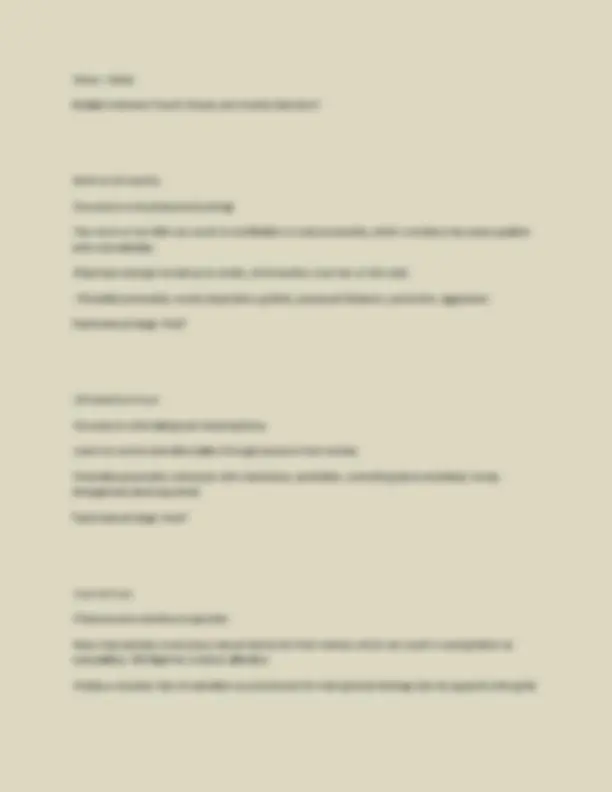Download NURS 526 Exam 1 Advanced Pathophysiology Exam 2025 Questions With Solved Answers and more Exams Pathophysiology in PDF only on Docsity!
NURS 526 Exam 1 Advanced
Pathophysiology Exam 2025 Questions
With Solved Answers
100% quaranteed
- An expectable or culturally approved response to a common stressor or loss, such as the death of a loved one
- Socially deviant behavior (i.e. political, religious, or sexual) and conflicts that are primarily between the individual and society (unless the behaviors are due to a dysfunction)
What is not considered a mental disorder?
- Associated with significant distress or disability in social, occupation, or other important activities
- Significant disturbance in cognition, emotion regulation, or behavior that reflects a dysfunction in the psychological, biological or developmental processes underlying mental functioning
What is considered a mental disorder per the DSM5?
- Define NP roles
- Identify competencies assumed to be held by all NPs who function in a particular role
- Varies broadly from state to state
Purpose of Scope of Practice?
- Authoritative statements regarding the quality and type of practice that should be provided
- Provide a way to judge the nature of care provided
- Reflect the expectation for the care that should be provided to clients with various illnesses
- Reflect professional agreement focused on the minimum levels of acceptable performance
- Can be used to legally describe the standard of care that must be met by a provider
- May be precise protocols that must be followed or more general guidelines that recommend actions
Purpose of Standard of Practice?
Understand the patient's illness to evaluate the effect on their lives and create a beginning diagnosis and treatment plan
Purpose of Psychiatric Interview?
- Create a relationship with client by being calming, warm, understanding, kind, respectful, concerned and focused
- Able to help patient better if a therapeutic alliance was formed
What is a Therapeutic Alliance?
- Therapist and patient work collaboratively to create therapeutic change through an affectionate bond
- Agreement on goals of therapy
- The therapist's ability to be empathetic and involved in therapy
- The ability of the patient to do the work of therapy
Important components of a therapeutic alliance?
- Giving recognition
- Giving information
- Offering self
- Giving broad openings
- Offering general leads
- Placing the event in time or sequence
- Making observation
- Encouraging description of perceptions
- Encouraging comparison
- Reflection
- Exploring
- Seeking clarification
- Presenting reality
- Voicing doubt
- Verbalizing the implied
- Attempting to translate into feelings
- Encouraging formulation of a plan of action
- Summarizing
Therapeutic Communication Techniques?
- Reassuring
- Approving
- Disapproving
- Rejecting
- Advising
- Probing
- Challenging
- Defending
- Requesting an explanation
- Indication the existence of an external source
- Belittling feelings
- Making stereotypical comments
- Giving literal responses
- Introducing an unrelated topic
Non-Therapeutic Techniques?
- Orientation
- Identification
- Exploitation
- Resolution
Four Phases of the Nursing Model?
- The PMHNP addresses individual and family problems with the patient
- Assess identified problems during the orientation phase
- Determines the underlying healthcare issues with the patient
- Collects psychiatric data
- Establish a trusting relationship
Psychotherapy Process?
Patient and therapist derive more specific strategies to deal with stressors
Middle Phase of Interpersonal Therapy?
- Consolidate gains
- Foster independence in the person
- Review risk of relapse and reappearance of depressive symptoms
- To contract again for continuation of treatment as needed
Termination Phase of Interpersonal Therapy?
Facilitate changes by the patient in order to address identified problems
Purpose of Group Therapy?
Assure dominant members are brought to the attention of the group, so they are able to address issues within the process
Role of leader in group therapy?
A person explaining to the group ways that person is able to cope with things
Role of information giver in group therapy?
A technique where special favors or awards are given to assure patient participation and involvement in group therapy
Role of Reinforcement in group therapy?
Increase subjectivity about thoughts governing their behavior.
This is done by:
- homework assignments
- dream description
- looking at ideas and beliefs the patient has about themselves
Goal of Cognitive Behavioral Therapy (CBT)?
- Encouraging patient to analyze early parental relationships
- Underlying meaning of behavior
- Identification of negative thoughts
- Effect of thoughts on feelings and behaviors
CBT Interventions?
- Anxiety
- Bipolar Disorder
- Eating Disorders
- Borderline Personality Disorder
Interpersonal Therapy (IPT) is useful for?
- Infancy (birth to 18 months)
- Childhood (18 months to 6 yrs.)
- Juvenile (6 to 9 yrs.)
- Preadolescence (9-12 yrs.)
- Early Adolescence (12-14 yrs.)
- Late Adolescence (14-21 yrs.)
Stages of Development?
How does Sullivan's theory define security operation?
All of the security operations that an individual uses to defend against anxiety and ensure self-esteem
How does Sullivan's theory define self system?
- Significant time spent in a home-like environment
- Interact with similar individuals
- Conduct different activities throughout the day
- May attend group or individual therapy sessions
- Establish treatment goals for themselves and community
- Learn new ways to respond from peers and counselors
What is Milieu Therapy?
Return to larger society when goals have been met
Goal of Milieu Therapy?
- Broad term referring to psychotherapy, behavior analytics, or a combination of the two
- Focus on behaviors or in combination with thoughts and feelings that might be causing them
What is Behavioral Therapy?
- Treatment method in which the client expresses all thoughts freely and without censoring self
- Freud concluded that talking about emotional issues had the potential to heal the wounds causing mental illness
What is Psychoanalysis?
- General appearance, attitude, behavior
- Speech
- Mood and Affect
- Thought content
- Thought process
- Impulse Control
- Cognition and Sensorium
Components of Mental Status Exam (MSE)?
- General description of what the patient talked about
- I.E. information and description related to symptoms or circumstances of depression, anxiety, compulsions, phobias, delusions, SI/SH/HI/AVH
How to describe thought content?
Clinical tool to determine suicide risk
Completely nonsensical combination of words
What is Word Salad?
Made up words
What is Neologisms?
Gets lost in details but eventually makes it make to the original topic
What is
Circumstantial Thought?
Thinking process stops and mind goes "blank"
What is Thought Blocking?
- Often seen in mania
- Pressured speech
- Rapid topic changes
- Topics may relate but in strange ways
What is Flight of Ideas?
- Fabrication of information to fill in missing gaps
What is Confabulation?
- Only understands things literally
- Common in schizophrenic patients
What is Concrete Thought Process?
- Able to think abstractly
- Can be determined by asking patient how a chair and table are similar or "why should people in glass houses not throw stones?"
What is Abstract Thought Processes?
Describes whether the patient is in good contact of their environment or is there is a distortion of reality (Typically presents as hallucinations)
What are Perceptual Disturbances?
- Misinterpretation of true stimuli
- I.E. a curtain in a dark room is mistaken for a person
What are Illusions?
- Sensations experienced by the client without real external stimuli
Personality Disorders and Mental Retardation
DSM-5 Axis 2?
General Medical Conditions
(medical issues that causes the mental disorder)
DSM-5 Axis 3?
Psychosocial and environmental problems
DSM-5 Axis 4
Global Assessment of Functioning (GAF)
DSM-5 Axis 5
- Scoring system that is used to assess how well an individual is functioning in their daily lives
- Scores range from 0 to 100
What is GAF?
100 - no symptoms
90 - minimal symptoms with good functioning
80 - transient symptoms that are expected reactions to psychosocial stressors
70 - mild symptoms or mild difficulty in social, occupation, school
60 - moderate symptoms or mild difficulty in social, occupation, school
50 - serious symptoms or mild difficulty in social, occupation, school
40 - some impairment in reality testing or communication or serious impairment in work, school, family relations, etc.
30 - behavior is considerably influence by delusions or hallucinations or serious impairment in judgement, communication or inability to function
20 - some danger of hurting self or others or occasionally fails to maintain minimal personal hygiene or gross impairment in communication
10 - persistent danger of severely hurting self or others or persistent inability to maintain minimal personal hygiene or serious suicidal act with clear expectation of death
0 - inadequate information
GAF Scoring System?
- The idea that from the earliest ages, children possess sexual feelings and motivations
- sexual instinct or drive directs a person toward action
- sexual drives are oral, anal, or genital
- stages are associated with a characteristic psychosocial process
- stages have been organized according to hierarchy of dominant body zones
What is Freud's Psychosexual stages of development?
- Freud believed that sexual instincts, together with the nature of nurturing relationships, play a role in the formation of psychiatric disorders
- Sexual stimulation exerts a predominant force on mental activity throughout the life
- When the boy identifies with father, they become masculine, identifies as males, repress sexual feelings towards mother
- A fixation in this stage can cause sexual deviancies, weak/confused sexual identity
Psychosocial stage: Phallic
- 6 to 12 yrs
- sexual urges remain represses
- children interact and play mostly with same sex peers
Psychosocial stage: Latency?
- 12yrs+
- begins at the start of puberty
- sexual urges are awakened
- through past lessons, adolescents direct their sexual urges onto opposite sex peers with the primary focus of pleasure in genitals
Psychsexual stage: Genital?
- only personality present at birth
- unconscious and includes instinctive and primitive behaviors
- driven by pleasure principle, which is the immediate gratification of all desires (anxiety if no instant gratification)
Freud's ID?
- develops from the ID
- functions in the conscious, preconscious, and unconscious mind
- personality component responsible for dealing with reality
- ego represents one component of your full personality
- ego provides direction and guidance
Freud's Ego?
- emerges around age 5
- holds the moral standards and ideals
- provides guidelines for making judgements
- has 2 parts (conscience and ego ideal)
Freud's Superego?
conflict: trust vs mistrust
- important events: feeding
- outcome: hope
Erikson's Stage of Development: Infancy?
- 2 to 3 years
- conflict: autonomy vs shame and doubt
- important events: toilet training




















































